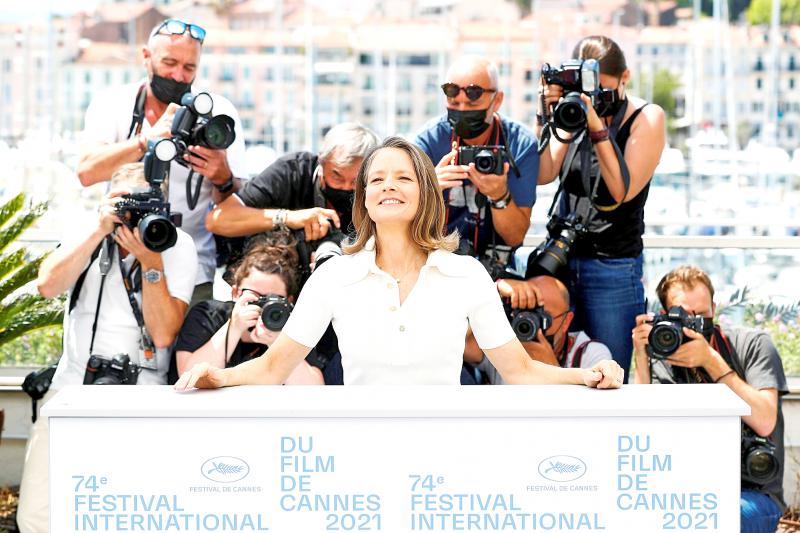There has never been a better time for women to enter the film industry, American superstar Jodie Foster told the Cannes festival on Wednesday, saying movies had too long been starved of female perspectives.
Addressing a large crowd of mostly young festival-goers in near-fluent French, she encouraged budding women filmmakers to seek their own truth and not try to please others.
“This is the moment for women to enter the industry,” Foster said.

Photo: Reuters
Although male domination of the industry had “not changed completely,” she said, “there is now an awareness that it’s been too long that we haven’t heard stories told by women... This is the moment.”
Foster received a lifetime achievement on Tuesday for her work that has included star turns in Taxi Driver and Bugsy Malone when she was a child, through to her Oscar-winning role in Silence of the Lambs. She has also directed several films, including Money Monster with George Clooney and Julia Roberts.
“I know it’s a bit cliche to say ‘tell your own stories,’” Foster said. “But what I mean is: ask yourself questions about the truthfulness of things and whether they resonate within you, instead of pleasing others, be it the public or producers.”
‘WORST REASON’
Foster said many young actors entered the movie business saying “I want to be looked at in my pretty clothes” which she said was the “worst reason” for taking up the profession.
“For some people it can take years, unfortunately, to cast off that armor that separates you from authenticity on the screen,” she said.
Talking about her own experience, Foster said Pedro Almodovar — who presented her with her honorary Palme the day before — was “the first feminist director for me.”
“It was the first time I’d seen films that talked about women in an authentic way,” she said of the legendary Spanish director, who has made women central to many of his films.
Foster called Almodovar an exception among male directors who “can’t easily transpose themselves into a woman’s body and ask themselves what the complicated and complex experience of a woman consists of.”
‘MALE CONFUSION’
Referring to her experience as a director, she said that there was still “confusion” in the male-dominated movie industry about how women exercise leadership positions.
“They don’t understand how women lead because they’ve never seen women lead,” she said of male producers. “They don’t know how to talk to women to convince them of something. They’re afraid because they don’t know how to deal with these situations.”
The Cannes film festival has raised eyebrows for including just four films by women directors in the list of 24 movies vying for the top Palme d’Or prize in the main competition.
The gender balance is tilted less towards men in the festival’s other competition categories, and the main jury this year is mostly female, including US star Maggie Gyllenhaal, Canadian-French singer Mylene Farmer and French-Senegalese director Mati Diop.
Only one woman has won the Palme d’Or in 73 editions of the festival — Jane Campion for The Piano in 1993.

That US assistance was a model for Taiwan’s spectacular development success was early recognized by policymakers and analysts. In a report to the US Congress for the fiscal year 1962, former President John F. Kennedy noted Taiwan’s “rapid economic growth,” was “producing a substantial net gain in living.” Kennedy had a stake in Taiwan’s achievements and the US’ official development assistance (ODA) in general: In September 1961, his entreaty to make the 1960s a “decade of development,” and an accompanying proposal for dedicated legislation to this end, had been formalized by congressional passage of the Foreign Assistance Act. Two

Despite the intense sunshine, we were hardly breaking a sweat as we cruised along the flat, dedicated bike lane, well protected from the heat by a canopy of trees. The electric assist on the bikes likely made a difference, too. Far removed from the bustle and noise of the Taichung traffic, we admired the serene rural scenery, making our way over rivers, alongside rice paddies and through pear orchards. Our route for the day covered two bike paths that connect in Fengyuan District (豐原) and are best done together. The Hou-Feng Bike Path (后豐鐵馬道) runs southward from Houli District (后里) while the

March 31 to April 6 On May 13, 1950, National Taiwan University Hospital otolaryngologist Su You-peng (蘇友鵬) was summoned to the director’s office. He thought someone had complained about him practicing the violin at night, but when he entered the room, he knew something was terribly wrong. He saw several burly men who appeared to be government secret agents, and three other resident doctors: internist Hsu Chiang (許強), dermatologist Hu Pao-chen (胡寶珍) and ophthalmologist Hu Hsin-lin (胡鑫麟). They were handcuffed, herded onto two jeeps and taken to the Secrecy Bureau (保密局) for questioning. Su was still in his doctor’s robes at

Mirror mirror on the wall, what’s the fairest Disney live-action remake of them all? Wait, mirror. Hold on a second. Maybe choosing from the likes of Alice in Wonderland (2010), Mulan (2020) and The Lion King (2019) isn’t such a good idea. Mirror, on second thought, what’s on Netflix? Even the most devoted fans would have to acknowledge that these have not been the most illustrious illustrations of Disney magic. At their best (Pete’s Dragon? Cinderella?) they breathe life into old classics that could use a little updating. At their worst, well, blue Will Smith. Given the rapacious rate of remakes in modern